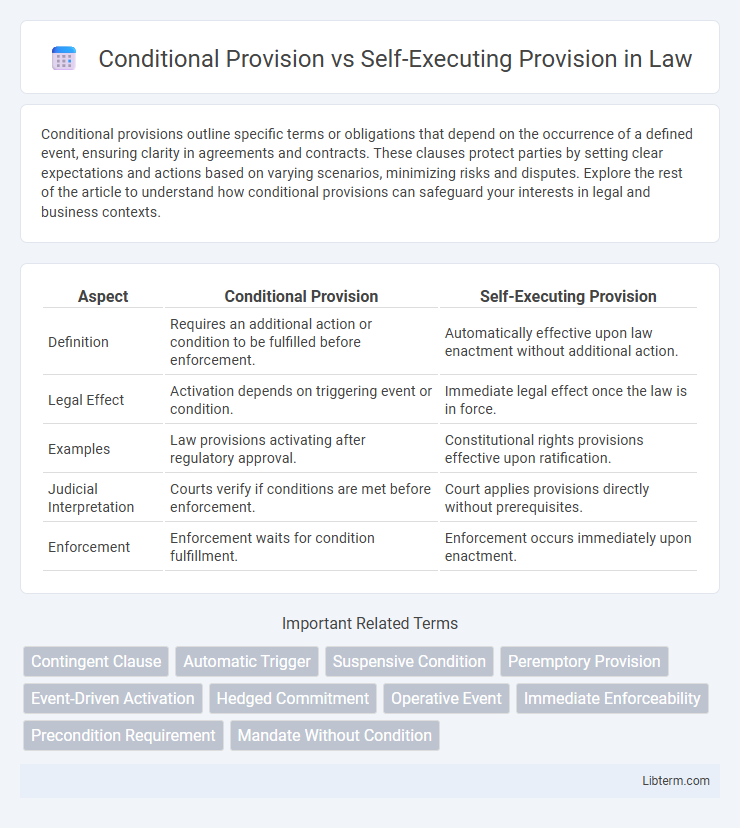Conditional provisions outline specific terms or obligations that depend on the occurrence of a defined event, ensuring clarity in agreements and contracts. These clauses protect parties by setting clear expectations and actions based on varying scenarios, minimizing risks and disputes. Explore the rest of the article to understand how conditional provisions can safeguard your interests in legal and business contexts.
Table of Comparison
| Aspect | Conditional Provision | Self-Executing Provision |
|---|---|---|
| Definition | Requires an additional action or condition to be fulfilled before enforcement. | Automatically effective upon law enactment without additional action. |
| Legal Effect | Activation depends on triggering event or condition. | Immediate legal effect once the law is in force. |
| Examples | Law provisions activating after regulatory approval. | Constitutional rights provisions effective upon ratification. |
| Judicial Interpretation | Courts verify if conditions are met before enforcement. | Court applies provisions directly without prerequisites. |
| Enforcement | Enforcement waits for condition fulfillment. | Enforcement occurs immediately upon enactment. |
Introduction to Conditional and Self-Executing Provisions
Conditional provisions require specific events or actions to occur before contractual obligations become enforceable, ensuring parties meet predetermined conditions. Self-executing provisions automatically take effect without the need for additional actions once the contract is executed, providing immediate enforceability. Understanding the distinction between these provisions aids in drafting agreements that clearly define the timing and triggers of contractual duties.
Defining Conditional Provisions
Conditional provisions in contracts are clauses that become effective only when specific conditions or events occur, requiring explicit fulfillment before rights or obligations are triggered. These provisions depend on external factors or future events, making their execution contingent rather than automatic. This contrasts with self-executing provisions, which operate automatically without the need for additional actions once the contract is in effect.
Understanding Self-Executing Provisions
Self-executing provisions operate without requiring additional legislative or judicial action, automatically triggering rights or obligations once specified conditions are met. These provisions provide clarity and immediacy by eliminating reliance on external implementation, streamlining legal and contractual enforcement. Understanding self-executing provisions involves recognizing their role in ensuring direct applicability and enforceability within treaties, contracts, or statutes.
Key Differences Between Conditional and Self-Executing Provisions
Conditional provisions require specific conditions or events to occur before legal effects or obligations arise, making their enforcement dependent on external circumstances. Self-executing provisions impose immediate legal duties or rights upon agreement, without the need for further action or conditions. Key differences lie in enforceability timing: conditional provisions await fulfillment of conditions, while self-executing provisions trigger automatic enforcement upon contract execution.
Legal Implications of Conditional Provisions
Conditional provisions in contracts require specific events or actions to occur before obligations become enforceable, creating uncertainty until those conditions are met. The legal implications include potential delays in performance and increased risks of disputes due to ambiguity about whether the condition has been satisfied. Courts often scrutinize the clarity and fairness of conditional provisions to determine enforceability, emphasizing the need for precise drafting to avoid litigation.
Advantages of Self-Executing Provisions
Self-executing provisions offer the advantage of immediate enforceability without requiring additional legislative or administrative action, ensuring clarity and legal certainty. These provisions reduce delays in implementation, thereby enhancing efficiency in contract execution and dispute resolution. Their automatic effect minimizes the risk of interpretative disputes, promoting smoother compliance and enforcement in legal and contractual contexts.
Common Examples in Legislation and Contracts
Conditional provisions in legislation and contracts require specific conditions or events to occur before the provisions become enforceable, such as a purchase agreement contingent on financing approval. Self-executing provisions automatically take effect upon the fulfillment of predetermined criteria without needing further action, commonly seen in contract clauses stipulating immediate ownership transfer upon payment. Examples include conditional funding disbursements dependent on project milestones versus self-executing penalty clauses activating immediately upon breach.
Judicial Interpretation and Enforcement
Conditional provisions require an external event or action before becoming enforceable, often leading courts to closely examine the intent and context to determine if conditions precedent are satisfied. Self-executing provisions activate automatically upon the occurrence of specified criteria, allowing judicial enforcement without further conditions or delays. Courts tend to favor clarity in self-executing terms to avoid ambiguity, while conditional provisions involve more complex judicial interpretation to assess whether the triggering events have properly occurred.
Impacts on Policy Implementation
Conditional provisions in policy frameworks require specific criteria or events to be met before enforcement, often leading to delays or uncertainties in implementation. Self-executing provisions activate automatically upon enactment, enabling immediate application and reducing administrative burdens. The choice between these provisions significantly influences policy effectiveness, compliance rates, and the speed of regulatory outcomes.
Choosing the Right Provision for Legal Documents
Selecting the appropriate provision in legal documents hinges on understanding the differences between conditional provisions, which activate only when specified conditions are met, and self-executing provisions that are effective immediately without requiring further action. Conditional provisions offer flexibility to adapt to future events, making them ideal for contracts with uncertain outcomes or performance triggers. Self-executing provisions ensure immediate enforceability, streamlining obligations and reducing the need for additional approvals or conditions precedent in agreements such as leases or employment contracts.
Conditional Provision Infographic

 libterm.com
libterm.com